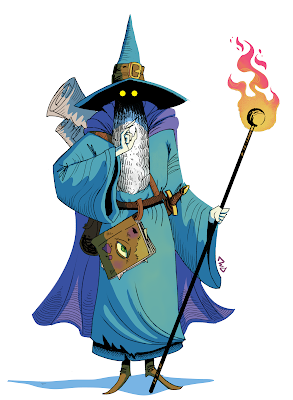Wizards are those who give up everything, their time, their health, and even their humanity in the pursuit of magical knowledge.
That “humanity” part is key, though wizards don’t always start out as humans. Doesn’t matter if they were human before, or elf, or frog-man, or whatever else. Once you become a wizard, you leave all that behind. You’re a Wizard now. Wizards are their own race, and as such, have their own culture.
 |
| A wizard. Note the outlandish clothing, sickly pale skin from lack of sunlight, inhuman yellow eyes, and threatening display of magic. |
“Why do wizards have such odd names?”
Wizards go to great lengths to protect themselves from magical threats (read: other wizards). One of the greatest threats to a wizard’s safety is their own True Name. Names are very powerful things when it comes to magic. Weaving a target’s True Name into a spell effectively nullifies any protections they may have against it. So, to keep their names from becoming known, wizards take on new names.
This new name could have something to do with the sort of magic they practice, but above all else the new name must be something that can’t be traced back to a certain country or people. Usually it’s just a bunch of nonsense, like trying to make a secure password by rolling your face across the keyboard. And because of their inflated egos, they tend to throw in a title or two with it. That’s where you get folks like Delriniath the Dark Seer, or Myzzithranax the Everlasting and so on.
“Why do they dress like that?”
You ever hear of aposematism? It’s that thing where poisonous animals advertise to other animals how bad it would be to try and eat them by being really brightly colored. Wizards do the same thing, in a way. Getting good at magic takes a long time and a lot of study, so a lot of wizards are either A). scrawny nerds or B.) old as sin, usually both.
Such people are prime targets for bandits and pickpockets. But no thief is gonna want to steal from the old man with rune-stitched robes, a pointy hat, and a walking stick with a skull on the end. And most people will automatically treat you with more respect, lest they risk having their family line cursed with bad luck or something. Being a wizard is as much doing the magic as it is looking the part.
Now you enterprising adventurers out there might be thinking, “why don’t I just dress up like a wizard then?”. Don’t. It’s not worth it. The only thing guaranteed to unite feuding wizards is for someone outside their circle to slight them. Impersonating a wizard is suicide.
“Why do they build towers?”
Usually, wizards are paranoid loners. They’re all trying to get a leg up on each other, so they isolate themselves in towers out in the middle of nowhere to practice the Art in peace, and to make sure their secrets are kept secret.
The tower serves a double purpose as both fortress and observatory. Anyone looking to carry out an assassination or steal a few secrets will have a tough time getting through floor after floor of magical security to reach the good stuff at the top. And being so close to the Heavens makes it easier for them to track the movements of the stars and other celestial happenings, to know when their spells and experiments will perform best.
“Why do they all go mad?”
Most of them are mad to begin with. You have to be at least a little crazy to dedicate so much of your life to learning forbidden knowledge. Anyways, if one isn’t already mad, the spells will take care of that. Sorcery is, in a sense, a form of voluntary spiritual possession. To cast their spells, wizards are constantly shoving these elemental spirits into their brains and letting them bounce around until the wizard is ready to release them. All that bouncing around leaves permanent marks on the wizard’s mind. The stronger the spell, the bigger the marks. And while not apparent at first, years of casting spells will turn anyone into a madman.
“What if I want to become a wizard?”
If you don’t feel like summoning a demon into your home or haven’t got any tomes bound in human flesh on hand, you could always become a wizard’s apprentice. But to do that, you’ve got to be the right fit for the job. Wizards only take on apprentices that can be easily manipulated, and won’t prove a threat to their lives. More often than not, these ideal apprentices are children, and children don’t usually want to spend all day cooped up in a tower reading books with some crusty old weirdo. That’s why all those creepy wizards in fairy tales always exchange their services for the hero’s first born son or something; gotta keep the craft alive somehow!
The apprentice isn’t taught much magic, they’re glorified errand boys the wizards use to do their chores, fetch magical reagents, or relay messages to other wizards through their apprentices. A smart wizard will only ever teach his student whatever spell would be absolutely necessary to complete a task for him, and they deliberately choose the least-direct solutions to such obstacles (whether the purpose of this is to teach lateral thinking or just because it’s funny depends on the wizard). Rather than teach the apprentice a levitation spell to cross a chasm, the wizard would most likely teach them magic missile and tell them to figure the rest out.
But really, why would you want to be a wizard anyway?
